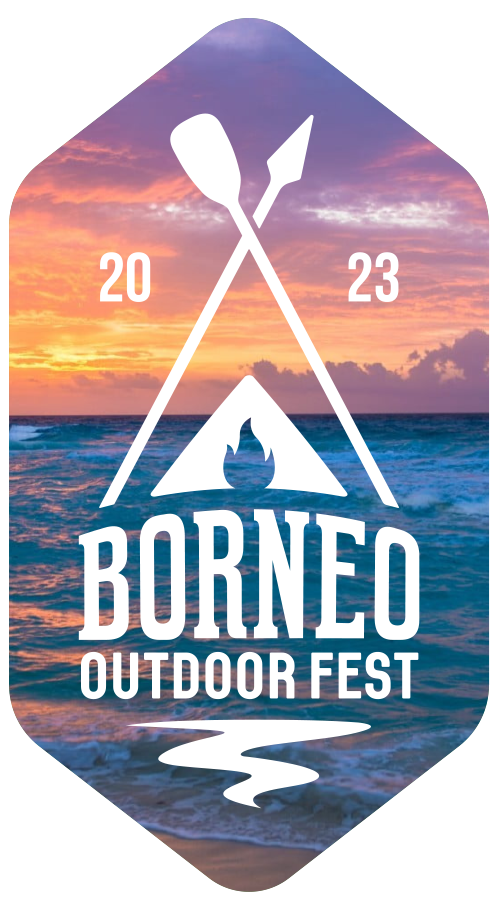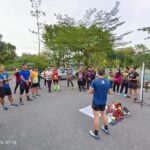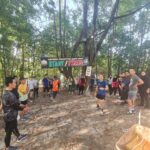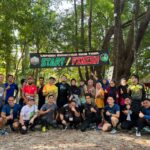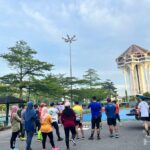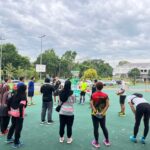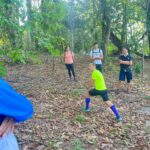
Option 1: Session 1 and Session 2 Seperate
Session 1: How to Trail Run, Techniques and Tips you need to know:
Learning Outcomes:
Running Techniques: Participants will acquire the knowledge and skills needed to demonstrate efficient running techniques for trail running, including proper form for uphill and downhill running, navigating uneven terrain, and negotiating obstacles. They will understand the importance of pacing and energy conservation during runs to optimize performance and safety.
Sighting and Navigation: Upon completion of the workshop, participants will be proficient in sighting and marking along the trail. They will demonstrate the ability to identify trail markers, interpret signage, and use landmarks for navigation, ensuring they can confidently follow designated routes. Participants will also be able to employ maps, GPS devices, or smartphone apps effectively to enhance their trail running experience.
Trail Etiquette: Participants will develop a strong understanding of trail etiquette, emphasizing respect for the natural environment and consideration for fellow trail users. They will adhere to essential practices, such as yielding to hikers and bikers, practicing “leave no trace” principles by disposing of trash responsibly, and staying on designated paths to preserve the ecological integrity of the surroundings.
These learning outcomes will equip participants with the necessary knowledge and skills to excel in trail running techniques, navigation, and trail etiquette, fostering a more enjoyable and sustainable trail running experience.
Session 2: Trail Running Essentials and Nutrition
Learning Outcomes:
Nutrition and Hydration: Participants will gain a comprehensive understanding of nutrition and hydration strategies, accommodating the diverse needs of various trail runners. They will explore different nutrition types, including budget-friendly options and naturally sourced alternatives, to cater to a range of dietary preferences and financial considerations. Participants will also delve into the unique nutritional requirements of distinct types of runners, such as cruisers, pacers, and racers, recognizing that each category demands specific fueling strategies. By the conclusion of the workshop, participants will be adept at making informed choices about pre-run and on-trail nutrition, ensuring they maintain optimal energy levels and hydration, irrespective of their running style. They will grasp how proper fueling enhances endurance, aids in recovery, and contributes to overall trail running success.
Gear and Clothing: Upon completing the workshop, participants will master the art of selecting suitable gear and clothing for trail running, considering varying budgets and running preferences. They will possess the knowledge to choose the ideal trail running shoes, moisture-wicking apparel, and essential accessories while staying mindful of financial constraints. Participants will also appreciate the importance of gear durability and how it aligns with the requirements of different types of runners, whether they are cruisers, pacers, or racers. This understanding will empower them to make gear selections that prioritize both safety and performance, ensuring a successful and cost-effective trail running experience.
Safety and Preparation: Participants will prioritize safety and preparation as foundational elements of trail running, taking into account the unique needs of cruisers, pacers, and racers. They will learn to plan meticulously for a trail run by assessing weather conditions, notifying someone of their plans, and carrying essential safety equipment. Participants will gain insights into wildlife safety precautions, the importance of a fully charged cell phone, and emergency contact information. Furthermore, they will recognize that safety and preparation approaches may differ based on the runner’s style and experience level. Whether they are embarking on a leisurely cruise, maintaining a steady pace, or striving for racing excellence, participants will tailor their preparations accordingly, ensuring a safe and successful trail running experience.
These comprehensive learning outcomes equip participants with a nuanced understanding of Nutrition and Hydration, Gear and Clothing selection, and Safety and Preparation, accommodating various nutritional needs, budget constraints, and the diverse styles of cruisers, pacers, and racers in the world of trail running.
Option 2: Combine both Session 1 and 2 into one Learning Outcome
Learning Outcomes:
Nutrition and Hydration: Participants will develop a comprehensive understanding of nutrition and hydration for trail running. They will explore a variety of nutrition sources, including budget-friendly and natural options, tailored to different dietary preferences. Participants will learn to make informed decisions about pre-run and on-trail nutrition, ensuring they maintain optimal energy levels and hydration. They will recognize the specific nutritional requirements of cruiser, pacer, and racer styles, enabling them to customize their nutrition strategies effectively.
Safety and Preparation: Safety and preparation will become second nature to participants. They will acquire the skills to meticulously plan and execute trail runs, including assessing weather conditions, notifying a trusted contact of their plans, and carrying essential safety equipment. Participants will understand the importance of wildlife safety precautions, having a fully charged cell phone, and accessing emergency contact information. They will tailor safety and preparation methods to accommodate their individual preferences and experience levels, ensuring a safe and successful trail running experience.
Gear and Clothing: Upon completing the workshop, participants will be well-versed in selecting suitable gear and clothing for trail running. They will confidently choose trail running shoes, moisture-wicking apparel, and essential accessories while considering various budgets and running preferences. Participants will appreciate the importance of gear durability and its alignment with the specific needs of cruiser, pacer, and racer styles. This understanding will empower them to prioritize safety and performance in their gear selections, enhancing their overall trail running experience.
Running Techniques: Participants will master effective running techniques for trail running, including proper form for uphill and downhill running, navigating uneven terrain, and surmounting obstacles. They will understand the significance of pacing, energy conservation, and balance during runs to optimize both performance and safety. Participants will emerge from the workshop equipped with the knowledge and skills needed to excel in trail running techniques, fostering a safer, more efficient, and more enjoyable trail running experience.
Sighting and Navigation: Participants will gain proficiency in sighting and navigation along the trail. They will learn to identify trail markers, interpret signage, and use recognizable landmarks to ensure they confidently follow designated routes. The use of maps, GPS devices, or smartphone apps for navigation will become second nature, reducing the risk of getting lost and enhancing their trail running experience. Participants will appreciate how effective navigation adds to the enjoyment and safety of their runs.
These comprehensive learning outcomes equip participants with essential skills and knowledge in Nutrition and Hydration, Safety and Preparation, Gear and Clothing selection, Running Techniques, and Sighting and Navigation, ensuring a safer, more enjoyable, and successful trail running experience tailored to their individual needs and preferences.
